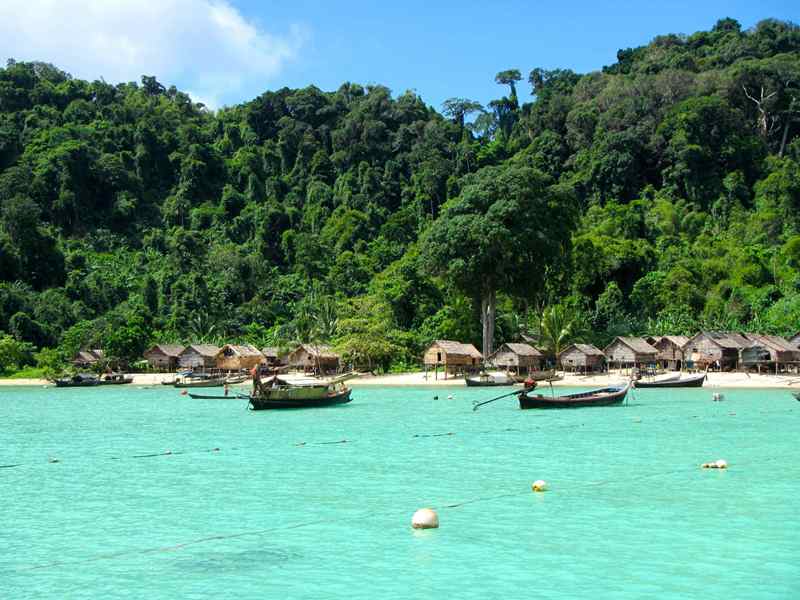Surin Village, photo by Project Moken
Having migrated along with other Austronesian groups from Southern China around 4,000 years ago, the Moken Sea Nomads of the Andaman Sea have always lived a precarious existence, spending half the year on the ocean, travelling in flotillas. It is against this ocean backdrop that they have developed a unique cultural identity and a world-view informed by a tapestry of folklore which weaves together a vast patchwork of maritime knowledge and experiences. These myths serve to preserve and reinforce their cultural values and make sense of relations with external societies as well as the forces of nature that have such a direct impact on their nomadic lifestyle.
In 2004, Laboon — the apocalyptic wave described in Moken myth as the “wave that eats people” — burst out of the floodgates of mythology and crashed upon the shores of Thailand after more than three thousand years of gestation in the Moken imagination. The real life events of the 2004 tsunami, perceived through the Moken’s mythological lens, creates a kaleidoscopic picture which merges past and present natural disasters with legend. It is believed by many that such catastrophe was initiated by the angry spirits of their ancestors, in a cleansing process similar to the great Biblical flood.
Since 1982 when the Surin islands (situated 55 km from the Thai mainland), where declared a national marine park by the Thai government Moken cultural sovereignty has been under threat. Many have found themselves hemmed in by state boundaries, depriving them of their nomadic liberty and yet without equal rights, due to the state’s refusal to grant them citizenship. This two-pronged assault on their freedom and rights, combined with restricted access to natural resources increases their dependence on the state and NGOs for jobs, housing and education, placing them in a culturally vulnerable position.
In the wake of the tsunami’s epic destruction some Moken believed the pathway was clear for them to create a revitalised identity for themselves, however it also prompted a free-for-all in which parties with vested interests including government officials and developers, attempted to prevent the return of survivors to their destroyed homes and villages claiming rights to their land. One particular group who sought refuge in a Buddhist temple on the mainland, found themselves at the mercy of various agents of power including some of the monks. After weeks of meetings and wrangling with the authorities they were eventually allowed to return their village on Ko Surin but unfortunately this has not secured the Moken’s cultural and economic autonomy. Eight years after the tsunami engulfed their island, the rip-tide of hegemony continually threatens to drag them under and drown any remnants of their distinct nomadic identity.
Nonetheless a number of Moken believe it is still possible to assert a renewed identity which can withstand the tides of environmental and cultural change. Hook, a member of the Moken community of Surin has emerged as a leader of the cause. Working closely with Norwegian film director Runar Jarle Wiik to make the documentary No Word for Worry (which is part of the wider multimedia initiative Project Moken), Hook embarked on a journey to make contact with Moken communities who had experienced less external interference and still had access to the resources needed to build a kabang (traditional houseboat) as well as other indigenous knowledge contained within mythology. Through this voyage he hoped to reinvigorate his own sense of identity and in turn other Moken of his generation.
In his mission to reassert a distinct identity, Hook has embraced modern media technologies such as film and social media to communicate his message to a wider audience. He also speaks Thai and some English as well as Moken, enabling him to act as a spokesman for the whole community. Although Hook and his supporters cannot restore an original Moken identity, by embracing the changes wrought by the tsunami and the latest technological developments whilst simultaneously reviving indigenous skills and knowledge they may just be able to harness the power of the Three Thousand Year Old Wave to produce what anthropologist Arunotai describes as “a cultural force…to inspire and revive their culture and traditions” to ensure their survival in an increasingly undifferentiated Thai cultural landscape.
Joshua Barron recently completed an MA in Social Anthropology at the School of Oriental and African Studies, University of London
 Facebook
Facebook  Twitter
Twitter  Soundcloud
Soundcloud  Youtube
Youtube  Rss
Rss 
